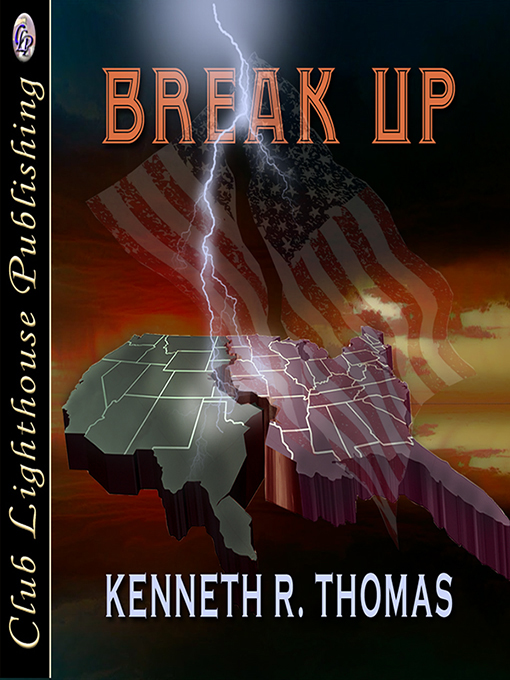NEW eBOOKS AVAILABLE IN 6 FORMATS
Adobe acrobat = PDF
HTML = .htm
Kindle = .mobi
MSReader = .lit
Nook = ePUB
PALM = .pdb
|
HOME >> Product 0568 >> Break Up>>

|

Touch image to enlarge
|
Break Up
Kenneth R. Thomas
Carnegie Wadsworth, a broadly loved and hated Republican President of the United States, is defeated in an extraordinarily contentious and disputed election by the handsome governor of Pennsylvania, Franklin Forbes. Wadsworth accomplished much during his Presidency, but many of his accomplishments were highly controversial.
|
$5.99
Paperback Buy Link
$11.00
|
|
Forbes ran as moderate Democrat who would unite the country, but in his inaugural address he promised an extremely left wing agenda that he was frequently able to implement through the use of executive orders. Republicans generally were especially appalled by his promises to repeal the Second Amendment, cut defense spending in half, and tax only workers who made more than $250,000 per year. The popular governor of Texas, a charismatic man named Jesse Hickok, convened all the governors from states that had made up the Old Confederacy and other interested parties to discuss strategies to deal with this “untenable political situation.” While secession was not the primary focus of the meeting, it was clearly on the table, and it gained strength, not only during the meeting, but in its aftermath.
Both the President and Fox News most popular’ commentator, Stone Burnett, were apprised of the content of the meeting, and Burnett interviewed Hickok on his show about the proceedings. Watching the show in his home in Columbia, South Carolina, was one of the nation’s most intellectual and influential conservatives, Edmund Adams Jefferson, Emeritus Professor of Political Science at the University of South Carolina. Immediately after watching the show, Jefferson ran to his study and reread Article V of the U. S. Constitution., smiled, and returned to his living room, thinking The South may finally rise again. Jefferson contacted Hickok the next day and proposed that he would try to work out a compromise that would avoid secession, but that if push came to shove, he would never betray the South. Hickok was willing to trust Jefferson, but warned that the secession movement was already growing in leaps and bounds.
Jefferson was an old friend of the President’s best friend and chief advisor, Jules Rosen. Both had worked in New York City during the 1980s, Jefferson for National Review and Rosen for The New Republic. Jefferson convinced Rosen to meet with him in Washington, D.C. to develop a compromise process. Rosen somewhat reluctantly agreed, but even he eventually talked the President, who didn’t want to be remembered as the President who allowed the country to break up, into giving Rosen and Jefferson a shot at resolving the differences between him and the potential secessionists. Jefferson, primarily, and Rosen developed a framework to find a way to compromise on 10 of the most contentious issues, which included things like immigration, reparations, taxation, and national defense.
Five members of the House of Representatives and five United States Senators, equally divided between Republicans and Democrats, were appointed to a committee named the Committee to Save the Union, and Jefferson and Rosen served as consultants. Both the President and Jesse Hickok agreed to abide by the compromises reached by the committee if such compromises were forthcoming. Although the experience offered Jefferson, a 70-year old widower, the opportunity to develop a deeply romantic relationship with a beautiful woman he meets on one of his flights between Columbia and Washington, the major thrust of the book is the sometimes lengthy, thoughtful, and spirited discussions in the Committee between powerful members of Congress regarding the 10 issues identified by Rosen and Jefferson, and approved by the President and Jesse Hickok. While the Committee itself is reasonably successful, other events serve to make the outcome completely unpredictable.
|
|
Length:
|
67397 Words
|
|
Price:
|
$6.99
|
|
Sale Price:
|
$5.99
|
|
Published:
|
06-2021
|
|
Cover Art:
|
T.L. Davison
|
|
Editor:
|
W. Richard St. James
|
|
Copyright:
|
Kenneth R. Thomas
|
|
ISBN Number:
|
978-1-77217-172-3
|
|
Available Formats:
|
PDF; HTML; Microsoft Reader(LIT); Palm (PDB); Nook, Iphone, Ipad, Android (EPUB); Older Kindle (MOBI); Newer Kindle (AZW3);
|
|
Paperback Price:
|
$11.00 Paperback Buy Link
|
|
|
THE YEAR WAS 2022. Carnegie Wadsworth had lost his bid for re-election in 2020 despite numerous legislative achievements and popular executive orders. Unfortunately, the mainstream media had continued to pummel him throughout his term, and he was never able to recover the enthusiastic voter support that had unexpectedly catapulted him into the Presidency in 2016. In a way, his loss was as surprising as his victory. His policies of cutting corporate and individual taxes, rebuilding the military, bringing illegal immigration under control, creating American jobs, defeating ISIS, replacing NAFTA, engineering an unprecedented trade deal with China, scaring the Devil out of Iran, improving the economic and social situation of minority group members, and making America energy independent were smashing successes. Most importantly, he was successful in creatively using the resources of both the public and private sector to develop a vaccine for the COVID-19 virus after ignoring the problem initially.
Carnegie Wadsworth, however, had several Achilles’ heels. His penchant for making outrageous statements; his generally non-presidential demeanor; his continual personal bragging; his blatant attempts to fill vacant judicial and other appointments with conservative ideologues; and his often hard-nosed cuts in social programs eventually turned enough special interest groups against him to negatively affect his popularity in some key Midwestern states. Plus, as noted previously, the mainstream press continually pummeled him with negative articles and almost unanimously endorsed the Democratic candidate. Carnegie Wadsworth himself gave the media enough ammunition that he was vulnerable to defeat by any reasonable Democratic candidate.
The Democratic candidate who beat him was the handsome, progressive governor of Pennsylvania, Franklin Forbes. Forbes was a Pennsylvania blue blood. He convinced a majority of traditional Northeastern, Midwestern, and West-Coast voters that he would provide America-First leadership without the rancor of the Carnegie Wadsworth Administration. The strategy worked, and Forbes flipped Pennsylvania, Michigan, Wisconsin, and Iowa by slim margins. Interestingly, however, Carnegie Wadsworth carried traditional red states with a more solid majority than he had in 2016. In fact, if California and New York had been eliminated from the mix, Carnegie Wadsworth would have won the popular vote by more than two million votes and the Electoral College vote by a comfortable margin.
There were outcries of “voter fraud,” especially in states like Pennsylvania, Michigan, and Wisconsin that had several voting precincts with large minority populations in major cities and/or large concentrations of consistently left-wing voters in other cities. Initially, unlike the media-reinforced opposition and non-acceptance by activist left-wing groups to Carnegie Wadsworth’s 2016 electoral victory, conservatives and other Carnegie Wadsworth supporters limited their opposition to Forbes’ election to demanding recounts in states where voter fraud had undoubtedly occurred. Such efforts were doomed from the start simply because in states like Michigan and Pennsylvania the same people who might have rigged the election were also in a position to rig the recounts….
|
|
To submit a review for this book click
here
|
|
|


|
|
|
|